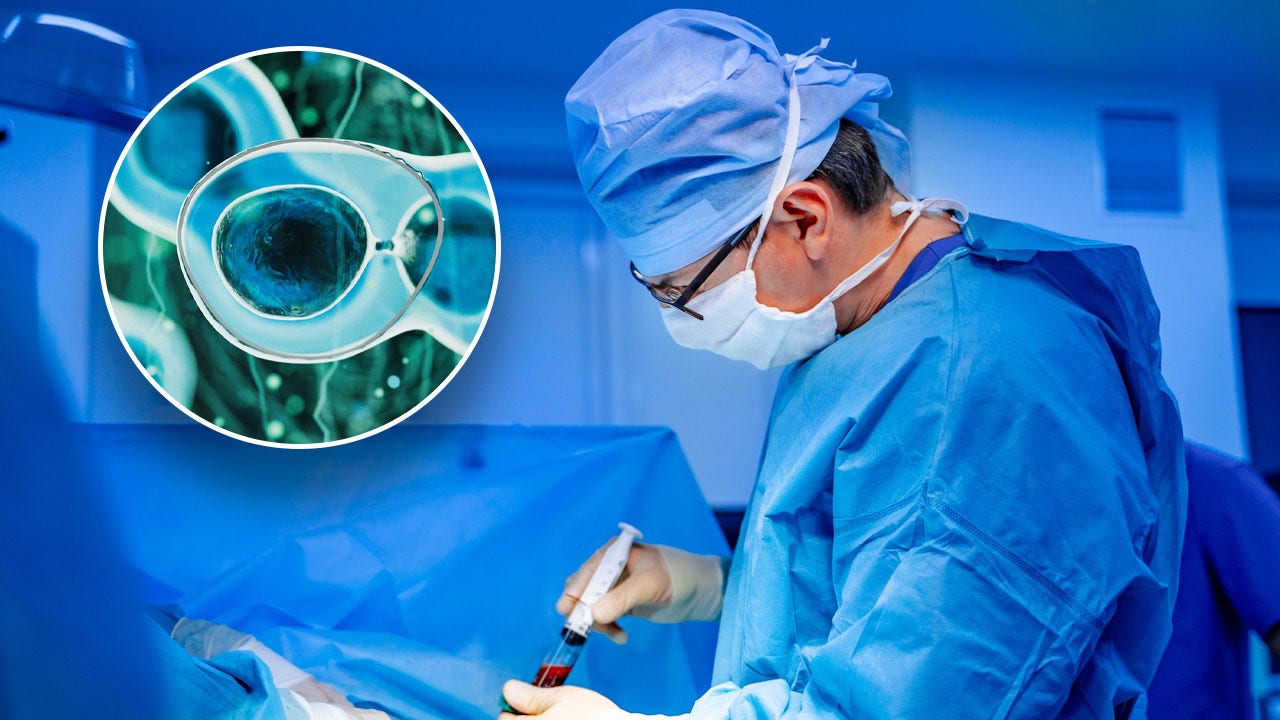Bone marrow transplants can be life-saving for patients suffering from certain types of cancer, blood disorders and other diseases — but for many patients, finding a match can take months or years.
Each year, roughly 18,000 people in the U.S. are diagnosed with potentially fatal diseases that could be successfully treated with donated bone marrow.
To help increase the chances of these patients getting life-saving treatment, the bioengineering company Ossium Health has created a program that offers deep-frozen bone marrow from deceased organ donors.
CHICAGO MAN RECEIVES KIDNEY TRANSPLANT WHILE FULLY AWAKE, GOES HOME VERY NEXT DAY
Earlier this year, after an unsuccessful four-month search for a matching donor, a 68-year-old Michigan woman became the first patient to receive a bone marrow transplant from an unrelated organ donor for blood cancer treatment.
Each year, roughly 18,000 people in the U.S. are diagnosed with potentially fatal diseases that could be successfully treated with donated bone marrow. (iStock)
The patient, who was suffering from acute myeloid leukemia, received the transplant at Henry Ford Health in Detroit, Michigan. She is now “rapidly recovering,” according to doctors.
“We were nervous about it because there was no precedence of using a bone marrow from a cadaver,” Muneer Abidi, M.D., a hematologist at Henry Ford Health who led the clinical trials for Ossium’s bone marrow product, told Fox News Digital during a phone conversation.
“So there was a little bit of apprehension and anxiety, but we were pleasantly surprised and happy when she robustly recovered her [stem cell] count, very similar to the anticipated time duration for a normal, healthy donor.”
Bone marrow barriers
Bone marrow transplant is the final-line treatment for blood cancer patients, according to Kevin Caldwell, the CEO of Ossium Health.
In the current health care system, a blood cancer patient who needs a bone marrow transplant has to find a healthy living volunteer who is a close enough match.
“Unlike many other organs, which you can just take from one person and transplant into pretty much anyone else who’s a similar size, the bone marrow must be very closely genetically matched,” Caldwell said during a conversation with Fox News Digital.
And the process isn’t easy, he noted.
“The donor has to be ready, willing and able to provide bone marrow for a complete stranger, to have their hip drilled into, and their bone marrow aspirated out or their stem cells mobilized — taking several days off of work and making a meaningful sacrifice to benefit someone they’ve never met,” Caldwell said.
The bioengineering company Ossium Health has created a new program that offers deep-frozen bone marrow from deceased organ donors. (Ossium Health)
There is also the challenge of timing.
“It can take months to find someone who’s healthy enough and willing to donate, and is a genetic match — and those are months that these blood cancer patients often don’t have,” Caldwell said.
About 55% of blood cancer patients successfully receive a transplant, he noted. The other 45% don’t, and most of those won’t survive.
Another widespread issue is that it’s difficult to find a fully matched donor for minorities, especially African-Americans, according to Abidi.
“The problem worsened during COVID,” he told Fox News Digital.
Meeting the need
To help address these issues, Ossium Health developed a bank of bone marrow that is derived from organ donors.
“We’ve built a network of 27 organ procurement organizations around the United States that manage organ donation, obtain consent and do the recoveries,” Caldwell said.
Ossium has launched a clinical trial — called PRESERVE I — that provides bone marrow to acute leukemia patients who need an allogeneic (genetically similar) transplant. (Ossium Health)
“We’ve trained them on how to recover the bone marrow, and then we built the facility where we process and manufacture the doses for the patients, and we cryopreserve it there on site.”
The goal, Caldwell said, is for bone marrow to be recovered and donated just as other organs — like hearts, livers, lungs, kidneys, corneas and skin — have been for decades.
“Before Ossium, the bone marrow from these donors — the life-saving stem cells that are present in the vertebral bodies of these donors — was not being used,” Caldwell said.
FOUR TEXAS RESIDENTS FOREVER CONNECTED BY TWO KIDNEY DONATIONS IN DIFFERENT CITIES: ‘SUPERBLY TIMED’
“It would be discarded despite the fact that these people had consented to organ donation.”
Ossium has launched a clinical trial — called PRESERVE I — that provides bone marrow to acute leukemia patients who need an allogeneic (genetically similar) transplant.
The Michigan woman, the first patient to be enrolled in the trial, received her transplant in May 2024 through Ossium’s HOPE Program.
The end goal, said Ossium’s CEO, is to “dramatically expand” the pool of bone marrow stem cells from deceased organ donors to help fight cancer. (iStock)
“Today, she’s alive and well and on a great recovery trajectory from her blood cancer, because we had a bone marrow unit that could match her and save her life,” Caldwell said.
“This case exemplifies the importance of this new option for patients with urgent needs.”
Benefits of cryopreserved bone marrow
There are several advantages of using bone marrow from deceased donors, Caldwell said — the biggest one being that much more of the organ can be used.
“Our donors don’t need their bone marrow anymore, so we’re able to recover much more of it than we could ever ethically take from a living person who still needs their bone marrow to live,” he said.
On average, they are able to get two to five times as many cells from an organ donor than from a living person, according to Caldwell.
“That may mean that we can do multiple transplants from one donor and save multiple lives.”
In other cases, they may be able to provide a larger dose of stem cells, which improves patient outcomes.
BLOOD TEST MAY PREDICT THE ORGANS IN THE BODY THAT ARE AGING FASTER THAN NORMAL, SAYS STANFORD STUDY
“For the first time ever, the doctor has a choice about what dose he or she wants to give to their patient — similar to when they’re deciding a dosage when prescribing a medication,” Caldwell told Fox News Digital.
The immediate availability is also a major benefit, Abidi added.
“The product is already available and collected, and we know exactly where it is stored,” he said.
Ossium built the facility where they process and manufacture doses of bone marrow for patients, and cryopreserve it there on site.” (Ossium Health)
“When we approach a healthy donor, it can take up to three months or longer from start to finish — but in this case, if we have a donor match identified in the inventory, the product can practically be shipped to us the next day.”
For patients with leukemias and other aggressive diseases, this immediate availability can mean the difference between life and death, Abidi said.
Consent and regulation
The donors on Ossium’s platform are “double-consented,” according to Caldwell.
The first step is for a person to agree to be an organ donor, which typically happens at the DMV.
Approximately 170 million people are registered to be donors, according to the Health Resources & Services Administration.
Ossium also follows a second consent process after the donor’s death.
“We also get consent from the family, to confirm that their loved one would like to provide these organs,” Caldwell said. “In the vast majority of times, the family members will honor that decision.”
Approximately 170 million people are registered to be donors, according to the Health Resources & Services Administration. (iStock)
Because the cryopreserved bone marrow is not a drug — and not significantly different from living donor bone marrow — it is not subject to approval by the Food and Drug Administration (FDA), Caldwell said.
“The FDA does not regulate bone marrow transplants from living donors — they consider those to be just like organ transplants,” he said.
After finalizing its product and facility, Ossium sent the process and data to the FDA, which confirmed that its oversight was not required.
“But we’re doing the studies anyway, to produce a data set that will empower bone marrow transplant doctors to use this product for their patients,” Caldwell said.
Looking ahead
Since the first transplant for the patient in Michigan, a second one was performed in Utah, and many more are planned, Caldwell said.
“We’re really excited about the outcomes from these first couple of patients,” he said.
Ossium now plans to publish the data to help boost enrollment in the clinical trials.
CLICK HERE TO SIGN UP FOR OUR HEALTH NEWSLETTER
The end goal, Caldwell said, is to “dramatically expand” the pool of bone marrow stem cells from deceased organ donors to help fight cancer.
“Leukemia is a treatable cancer if you are able to find a donor in time,” Caldwell said.
“We don’t want anyone to die because of a logistical problem. We want to achieve a world where virtually everyone who needs a bone marrow transplant can get one.”
While Ossium’s platform is currently focused on treating blood cancers, there are other ways it could benefit patients in the future, Caldwell said.
For more Health articles, visit www.foxnews.com/health
“There are many other applications of having a clinical bank of stem cells available, including doing organ transplants without immunosuppression and preventing organ rejection,” he said.
Added Abidi, “As more data becomes available to show the safety in larger number of patients and donors, this certainly is going to be a very nice addition.”
Melissa Rudy is senior health editor and a member of the lifestyle team at Fox News Digital. Story tips can be sent to melissa.rudy@fox.com.



